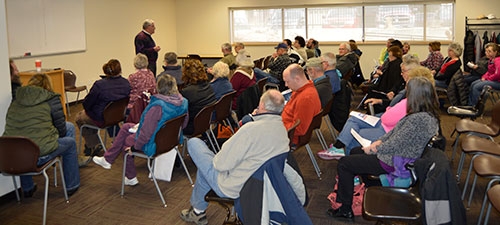You are here
Home ›Iowa House Democrats discuss concerns with local public at legislative listening post

Democrats from Iowa House of Representatives host local forum ... Mark Smith (standing), Iowa House District 71 Representative from Marshalltown and the Iowa of House Representatives Democratic Leader, addressed a room full of attendees in a legislative listening post forum held in the community room of Robey Memorial Library in Waukon Saturday, March 11. Smith first presented some perspective on several points of interest, including the recently signed de-appropriation bill and the results of other recent legislative moves, before he opened up the forum to questions from members of the public in attendance, some of which focused on education and minimum wage, among other topics. Standard photo by Joe Moses.
by Joe Moses
Iowa House of Representatives Democratic Leader Mark Smith, who is the District 71 Representative from Marshalltown, conducted a listening post event at Robey Memorial Library in Waukon Saturday, March 11. During the hour and a half meeting, Smith listened to and addressed various concerns from the public in attendance, a crowd numbering around 40 individuals.
Smith began the meeting by discussing the de-appropriation bill passed and signed early in this year's new legislative session that has cut $118 million from the State of Iowa's budget and has resulted in the closure of the Luster Heights facility in Allamakee County, in addition to resulting in cuts that will affect community colleges and public education, which Smith indicates will all have a detrimental effect on Allamakee County’s economy.
Smith described what is happening in Des Moines in the Iowa Legislature as "a wholesale assault on everyday Iowans." Smith commented, "The bottom line is that you are paying more in taxes today than you have ever paid before in your life and you are getting less return for the taxes you pay. You are seeing less money returned to your communities, less money going into your public schools, less services for the elderly. This money is, instead, going towards corporate welfare." Smith then opened the meeting to questions and comments from the public.
Ann Hart, a local retired school administrator, discussed the voucher system in education and its impact on schools, which Smith further discussed as being key to the destruction of rural Iowa, suggesting that as public schools die their communities often do so as well. Hart further discussed her concerns now that collective bargaining has been capped through the passing of recent legislation, suggesting that, as a result, young teachers will not stay in this state with salaries being capped. She further elaborated on several scenarios where public schools do not receive funding due to the voucher system.
Smith also detailed concerns with legislation that he explained will result in 65,000 Iowans experiencing a wage decrease due to a required statewide minimum wage after four counties in Iowa have taken the action to move the minimum wage beyond the state level to improve the lives of citizens. Smith also discussed that northeast Iowa is going to lose family planning services in this region through Northeast Iowa Community Action Corporation (NEICAC) June 30 of this year as a result of budget cuts.
Other topics addressed by Smith and discussed with the public in attendance included gun and "stand your ground" legislation, voter I.D. requirements, Workers' Compensation, college debt, Medicaid privatization and agricultural trading partners Mexico and China.

